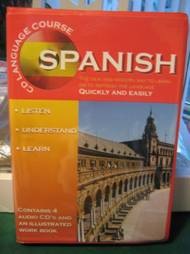 At university this year, I started studying a “second” language. In actual fact, this is my third language, because I already speak two – one at home and one with everyone else.
At university this year, I started studying a “second” language. In actual fact, this is my third language, because I already speak two – one at home and one with everyone else.
The language I chose to study is Spanish. The reason I picked it was probably that when I was in primary school, I studied with a wonderful teacher we called “Señor Carlos”, who made it so much fun that I will forever associate Spanish with fun times. One day, I am determined to visit Spain or some Latin American country so I can show off my amazing Spanish skills.
Actually, the more I study, the more I realize there are quite a few languages I would like to learn, none of which are anything like any of the languages I already speak. I am particularly captivated by Arabic and Russian and my latest addition is AUSLAN (AUstralian Sign LANguage).
What I want to talk to you about is the benefit of speaking a second and even a third language. Being the devil’s advocate that I am, I want to share with you a few things that may not be so great . Then, I want you to tell me what you think. If you spoke (or if you already speak) a different language (other than English, that is), would you teach it to your kids?
First of all, I have to be upfront and say that I LOVE speaking a second language. In the community that I live in, I am one of a few who do and it makes me feel special. Lots of people find it fascinating and I love the positive attention. In the development course that I am just learning, we recently covered the topic of language acquisition. The main theories revolved around acquiring a new language and the most important thing was that languages all have a critical period. I know my mom normally says it is until the age of 5, but many researchers believe it extends as far as puberty.
So, if I could go back to a time when learning a language was a breeze, I would learn a thousand more. To top it all off, research in the early 1920’s showed that children who were bilingual showed better academic performance and exhibited “more cognitive elasticity including a better ability to analyze abstract visual patterns”.
If I understand my Neuroscience course correctly, there are simply more synaptic connections in a multilingual brain and the information is much easier to remember, much easier to retrieve and much harder to forget.
 My mom talks in her workshop Language of the Heart about the importance of parents speaking their native language with their children. And when you meet people who don’t do it, you realize just how important it is. Because when you speak Swahili and your child speaks English, you might not understand each other and there’s a bit of a disconnection in your family.
My mom talks in her workshop Language of the Heart about the importance of parents speaking their native language with their children. And when you meet people who don’t do it, you realize just how important it is. Because when you speak Swahili and your child speaks English, you might not understand each other and there’s a bit of a disconnection in your family.
There are many people in my parent’s circle of friends who feel it is simply too hard to force their kids to speak a separate home language. It is much easier just to let them turn to English.
And it is true! We are so immersed in our English-speaking environment that it is much easier to just speak English at home. But then Grandma and Grandpa call on Skype to ask how everyone is and the kids just look blank and say nothing, because they have no idea what their own grandparents are saying. It is even worse when they go “back home” to visit, and the kids spend the entire time watching American cartoons, because “no one in this country speaks any English!”
And you know what? I can promise you that one day they are going to reach their 20s and they’re going to be very upset at you for not insisting.
If my grandparents had insisted with my parents, I would now be speaking six languages. SIX! Do you know how cool that would be? That is much more impressive than two, surely, and the benefits are phenomenal.
Let me give you an example. My dad speaks two languages fluently. After high school, he studied Arabic for a time and when we lived in Thailand, he also spoke some Thai. And he has this amazing ability to understand even the most bizarre concepts. Because he can link almost anything to words he knows from all kinds of languages and the meanings become clear. This amazing deductive skill has come in handy for me many a time with my assignments in science, in psychology, in philosophy and now, even in Spanish.
So let’s sum up the benefits.
- My parents, my siblings and I have our own language that no one but us can understand most of the time. No need to hide or tone down the conversation. For all intents and purposes, it’s just us at the supermarket anyway
- My siblings and I talk to our grandparents and our aunts and uncles overseas with no problems at all. This way, we get to feel a bit closer to our otherwise nonexistent extended family
- We all read and write in a different language, which give us a much wider variety from which to choose
- We understand two languages, so the pool of movies and songs from which to choose is bigger
- If research is correct, then our studies are much easier for all three of us kiddies than they otherwise would be. This could easily explain our academic achievements
- We can mix with more types of people and have more friends, because we have more practice at adapting to another form of communication
- And best of all, is if I want to turn to my brother and tell him his fly is undone, no one need know…
So now that we have established that speaking more than one language is a great thing, let’s talk about some downsides. They are small, but I just want to get them off my chest.
Speaking a different language at home to what everyone else speaks is not all daisies. We speak Hebrew at home and English everywhere else. Because of this, having people over for dinner is not as effortless as it would be in other homes.
 When an English-speaking person joins us for a meal, we need to change our dialogue completely. Jokes aren’t the same and conversation is completely shifted. It is a foreign concept for us to speak English around the dinner table. Or the breakfast table. Or anytime at home, for that matter.
When an English-speaking person joins us for a meal, we need to change our dialogue completely. Jokes aren’t the same and conversation is completely shifted. It is a foreign concept for us to speak English around the dinner table. Or the breakfast table. Or anytime at home, for that matter.
This means that sleepovers are a bit of a juggling act for whichever of us has the friend over. This middle person is always bridging between the family and the friend. Of course, we all speak English as a primary language, but it just isn’t the same.
Another thing for me is that now that I am older and thinking about life partners, I need to consider the language that my partner speaks. Of course, after taking these last few psychology courses, he will hopefully speak as many languages as possible, but the key thing is the language in which we share our love.
As kitschy as it sounds, my parents love me and my siblings (and each other) in Hebrew. It just doesn’t feel the same to them in English.
And me? Well, I have two first languages, so I love people in the same languages they love me. But what about my partner? What if he speaks English? Or what if he speaks Afrikaans? In what language will he love me? It is all well and good to say “I love you” in whatever language but mean it the most only in your “language or the heart”?
So now, it’s your turn. What do you think? Is it worth it? Will you teach your kids the languages that you speak?
Happy parenting,
Eden











